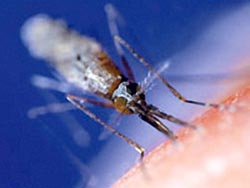New way to fight malaria
Australian scientists have identified eight types of genes involved in the development of malaria parasites in human red blood cells. This opens a new direction in fighting malaria.
Malaria, a malaria parasitic disease that is currently the most common disease in the world, kills up to one million to three million people every year, of which 90% are African.
The disease is characterized by fever, headaches and vomiting, caused by many parasitic strains, of which the most dangerous is Plasmodium falciparum. Anofen mosquito transmits this strain of malaria parasite into the human body through mosquito bites. Upon entering the human body, the parasite invades red blood cells in the blood and begins to multiply.
Researchers from the Melbourne Institute of Medical Research claim that in order to be able to grow in a good environment, Plasmodium falciparum has created major changes in the structure of red blood cells. The infected cells will almost lose their old sustainable structure and the surface of the red blood cells will appear small hooks erect in the walls of the blood vessels, and so they will prevent red blood cells from moving in the blood. .

Mosquitoes transmit malaria (Photo: nouvelobs)
This is the main way for parasites to survive in the body. Without this method, a part of the red blood cells carrying parasites will be destroyed in the process of moving into the spleen. Parasites following the mechanism of invading red blood cells, when they have spread to the arteries leading blood to the brain, will cause the most dangerous form of malaria: cerebral malaria.
Through genetic modification of the Plasmodium falciparum strain, the researchers were able to format eight genes that help create the proteins needed for cell regeneration. While investigating the normal activity of these genes, they concluded that parasite-infected erythrocytes do not enter the blood vessels anymore. A pretty interesting result.
Indeed, it could be exploited to create new drugs especially those that carry the genes of these genes. But scientists also hope to create modified and weakened forms of malaria parasites for use in making vaccines.
- Change the environment to fight malaria
- How to diagnose, treat and prevent malaria
- Viagra helps fight malaria
- Mutant mosquitoes fight malaria
- 847 million USD for the fight against AIDS, tuberculosis and malaria
- Over 10 million USD helps Vietnam fight HIV / AIDS
- The first vaccine against malaria loses its effectiveness after 4 years of injection
- A malaria vaccine has been developed
- A breakthrough in preparing malaria vaccines
- New way to kill malaria parasites
- The trial of malaria vaccine achieved positive results
- Conduct a trial on human malaria vaccine
 Green tea cleans teeth better than mouthwash?
Green tea cleans teeth better than mouthwash? Death kiss: This is why you should not let anyone kiss your baby's lips
Death kiss: This is why you should not let anyone kiss your baby's lips What is salmonellosis?
What is salmonellosis? Caution should be exercised when using aloe vera through eating and drinking
Caution should be exercised when using aloe vera through eating and drinking Pig's blood helps to stay young, lose weight, and prevent cancer, but is 'a big no-no' for the following people
Pig's blood helps to stay young, lose weight, and prevent cancer, but is 'a big no-no' for the following people  How does the kidney filter blood?
How does the kidney filter blood?  American millionaire uses 17-year-old son's blood to rejuvenate
American millionaire uses 17-year-old son's blood to rejuvenate  Why does nature produce so many blood-sucking insects?
Why does nature produce so many blood-sucking insects?  Superpower gene discovered, 'superhumans' will soon become a reality in the future!
Superpower gene discovered, 'superhumans' will soon become a reality in the future!  New discovery about people who may be naturally resistant to nCoV
New discovery about people who may be naturally resistant to nCoV 